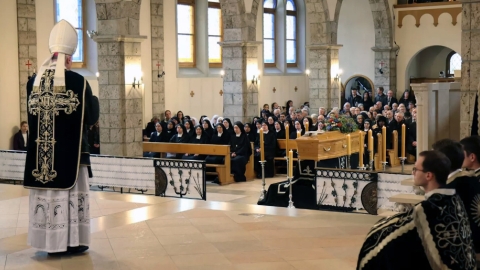Pope Francis on Blaise Pascal and Sincerity of Intention

On June 19, 2023, Pope Francis issued the Apostolic letter Sublimitas et miseria hominis, subtitled “On the Fourth Centenary of the Birth of Blaise Pascal.” The letter, in addition to lauding the intellectual and spiritual virtues of the French polymath, contains an eye-opening reflection on the theological controversies that embroiled Pascal and the “sincerity of his intentions.”
Pascal, Jansenism, and the Jesuits
Born in Clermont in central France in 1623, Pascal was quickly recognized as a child prodigy and spent his formative years pursuing an education in classical languages and mathematics. By his early 20s, he was credited with creating one of the first calculating machines while engaging in pioneering work with mercury barometers. It was during this period that Pascal became aware of the French Catholic reform movement which came to be referred to as “Jansenism.”
Inspired by the theology of Cornelius Jansens, Bishop of Ypres (Belgium), and the spiritual counsels of Jean Duvergier de Hauranne (Abbé de Saint-Cyran), Jansenism was tied strongly to the Cistercian abbeys of Port-Royal des Champs and Port-Royal des Paris. Under the watchful eye of Mother Marie Angélique Arnauld, Port-Royal implemented a strict adherence to the Benedictine Rule of monastic life, along with promoting deep Eucharistic piety. Although Jansens died in 1638, his multivolume magnum opus, Augustinus, reignited a hearted quarrel over grace and free will throughout the 17th and 18th centuries, with the French Jesuits in particular castigating the late bishop’s work as thinly disguised Calvinism due to its heavy emphasis on predestination and mankind’s depravity. A 1642 papal bull, In eminenti, condemned five propositions allegedly found in Augustinus. Rather than accept this papal judgment, Jansenist supporters such as the philosopher Antoine Arnauld denied that the condemned material could be found in Jansens’s theology and refused to submit to the bull.
Regardless, Pascal appears to have been impressed with Jansenist piety as early as the 1640s, though his ongoing scientific inquiries and academic pursuits at the time seem to be at odds with a fervent embrace of Jansenism, particularly when it comes to privileging worldly knowledge over knowledge of God. In 1651, following their father’s death, Pascal’s sister Jacqueline entered Port-Royal, which brought him closer to Jansenist circles. Then, on November 23, 1654, Pascal had a profound religious experience which inspired him to abandon his scientific work in favor of theological disputation.
With Arnauld and the Jansenists under attack from the French Jesuits and those they influenced, Pascal penned a series of pseudonymous letters satirizing the supposed laxity of Jesuit moral theology and confessional practices. Collected under the title The Provincial Letters, these highly charged missives effortlessly wove together logic, ridicule, and an uncompromising vision of the corruption that had seeped its way into the French Church and society to defend Jansenism generally and Arnauld in particular. Regarded to this day as a high-water mark of French prose, the Letters’s style came to influence later (decidedly non-Catholic) French intellectuals such as Voltaire and Rousseau.
Until his death at the age of 39 on August 19, 1662, Pascal remained aligned with Jansenism insofar as it upheld what some regard as a “primitivist Catholicism” structured around prayer, spiritual reading, and rigorous asceticism. While Jansenism, and the various French reform movements clumsily referred to as Jansenist by their critics, came to be associated with several peripheral liturgical and doctrinal disputes, Pascal remained committed to defending the truth of Catholicism. Despite being in perpetually poor health, Pascal hoped to complete an apologetic work that broke from earlier, rational, attempts to defend the Faith, though he was never able to bring it to completion. Following his death, several bundles of Pascal’s notes were found under various headings. However, without an express plan for the order in which the notes were to be published or confirmation Pascal had even intended for all of them to see the light of day, scholars continue to debate the “correct” formulation and interpretation of Pascal’s most famous work, the posthumously published Pensées.
Time Heals Some Wounds
In the centuries since Pascal’s death, the Pensées have drawn considerable interest from Christian intellectuals across confessional boundaries, while The Provincial Letters, along with Pascal’s other writings on grace and free will, have faded from memory despite their initial notoriety. The Jesuits, who eventually found themselves expelled from France and later suppressed in the 18th century, became a visible (albeit not uncontroversial) fixture of Catholic life following their restoration in 1814 while the Jansenists never recovered from the political and ecclesiastical power brought to bear against it. While contemporary academics work to paint a nuanced portrait of Jansenism unmarred by the polemical distortions that have accrued over the centuries, it is still commonplace for any Catholic position that is deemed “strict” or “rigorous” to be derogatorily labeled “Jansenist.”
In praising Pascal’s life, piety, and intellectual achievements, Pope Francis takes time out at the end of Sublimitas to discuss “Pascal’s relationship to Jansenism” while recognizing that despite the papal condemnations directed at Jansens’s work, “[Pascal] maintained that those propositions were not present in the Augustinus or held by those associated with Port-Royal.” While acknowledging that both Jansens and Pascal made statements that “do not ring true,” “[w]e should realize, however, that, just as Saint Augustine sought in the fifth century to combat the Pelagians, who claimed that man can, by his own powers and without God’s grace, do good and be saved, so Pascal, for his part, sincerely believed that he was battling an implicit pelagianism or semipelagianism” found in a certain strand of Jesuit theology. As such, “Let us credit Pascal with the candour and sincerity of his intentions.”
What, some might ask, about the “candour and sincerity” found in the intentions of later Catholics compelled by conscience to battle implicit (if not explicit) errors in contemporary Jesuit theology and promoted by churchmen, including bishops and popes, who have come under its influence? What “credit” is due to them?
Missing from Francis’s concluding paragraphs is any assessment of what Pascal might think of the state of the Catholic Church today. How would this sincere and deeply pious man of the Church who was horrified by the perceived moral laxism of 17th century Jesuits react to the laxism of a 21st century Jesuit such as Fr. James Martin on matters of sexual morality? What would Pascal, who fought to uphold his friend Arnauld’s position on infrequent Communion lest Catholics incur damnation by approaching the sacrament hastily, have to say about ongoing efforts throughout the Church, and apparently approved by the Jesuit Pope himself, to open reception of the Eucharist up to those unrepentantly living in mortal sin? While the Pope is right that Pascal “set the love of his brothers and sisters above all else,” this love was expressed by Jansenists like Arnauld and the aforementioned Abbé de Saint-Cyran calling Christians to repentance through spiritual practices most today would castigate as “severe.”
There is no need to defend every jot and tittle of Pascal’s oeuvre to appreciate his life and works, just as the more extreme formulations of Jansenist theology and piety needn’t be accepted to admire their pursuit of holiness. Even if Pope Francis himself harbors Jesuit-tinged reservations about Pascal, the passage of time has left him open to embracing the Frenchman who once ruthlessly mocked and cast opprobrium upon the Pope’s own order.
Such charity seems to still be in short supply, however, regarding another Frenchman who, with “candour and sincerity” and out of “love of his brothers and sisters,” lived his life in service to the Church in unwavering opposition to those who would compromise the Faith.





